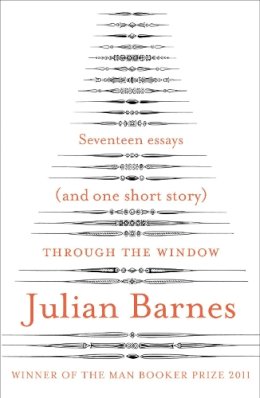

Through the Window: Seventeen Essays (and one short story)
Julian Barnes
In these seventeen essays (and one short story) the 2011 Man Booker Prize winner examines British, French and American writers who have meant most to him, as well as the cross-currents and overlappings of their different cultures. From the deceptiveness of Penelope Fitzgerald to the directness of Hemingway, from Kipling's view of France to the French view of Kipling, from the many translations of Madame Bovary to the fabulations of Ford Madox Ford, from the National Treasure Status of George Orwell to the despair of Michel Houellebecq, Julian Barnes considers what fiction is, and what it can do. As he writes in his preface, 'Novels tell us the most truth about life: what it is, how we live it, what it might be for, how we enjoy and value it, and how we lose it.'
When his Letters from London came out in 1995, the Financial Times called him 'our best essayist'. This wise and deft collection confirms that judgment.
Product Details
About Julian Barnes
Reviews for Through the Window: Seventeen Essays (and one short story)
Tom Cox
Sunday Times, Books of the Year
Engaging, eloquent, entertaining and erudite... There is a capacious generosity throughout this book, and I would defy anyone not to leave without feeling both better informed and better disposed... It is rare indeed for a collection of occasional pieces such as this to inspire feelings of profound thankfulness.
Stuart Kelly
Scotsman
A truly wonderful collection.
Sunday Times
The book relies on stylish intelligence and cool calm to accomplish its mastery… This is a coquettish book. Barnes flatters readers into feeling that they may be as shrewd, discriminating and attractive as he is.
Richard Davenport-Hines
Spectator
A devastatingly brilliant critic.
Olivia Laing
Prospect
As for the other essays, they all represent Barnes at his most engaged and, in his way, passionate... When he cares about something, you know it.
Nicholas Lezard
Guardian
The parallels between Barnes's essays and his fiction run much deeper. The Sense of an Ending asks to be read twice, once to listen to what the narrator has to say, and a second time to hear what he is busily avoiding or repressing, and many of these essays work in a similar way… His collection is also full of unexpected pleasures… Even the index is brimming with jokes. Such local surprises are typical of the book as a whole, which encourages readers to dip and rewards them for lingering.
Robert Douglas-Fairhurst
Telegraph
There are many delightful biographical and bibliographical details among the literary criticism… Two recurring themes emerge from this anthology: France and death. Barnes is a keen observer of both lands.
Christian House
Independent on Sunday
A wonderfully learned and witty guide to how fiction operates.
Anthony Cummins
Metro
Man Booker Winner’s essays on fellow writers – magnificent.
Sunday Times Ireland
